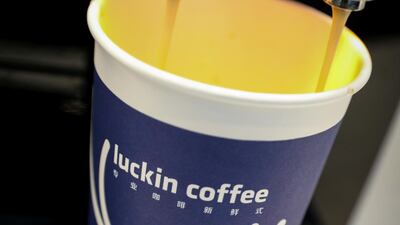China’s Luckin Coffee hasn’t been having much luck lately. The last thing a retail business in the middle of rapid expansion needs is a deadly virus that keeps consumers off the streets and away from malls. What could be more damaging? Perhaps an attack by short-sellers branding your business a fraud.
Shares in Nasdaq-listed Luckin Coffee plummeted 11 per cent on Friday after Carson Block’s Muddy Waters Capital tweeted that it has a short on the stock, citing an unattributed 89-page report it had received that alleged the chain has accounting issues and a broken business model. It could have been worse. Luckin shares were down as much as 27 per cent before rival short-selling firm Citron Research defended the company, saying it was long the stock and the coffee chain’s business in China was “on fire”.
Whatever the merits or otherwise of the anonymous report — which Muddy Waters said it found credible and Andrew Left’s Citron said would “fall short on accuracy” — Luckin faces challenges from the coronavirus, which has caused some cities in China to impose travel restrictions, manufacturers to halt output and the government to extend the Lunar New Year holiday. At the same time, the coffee chain has a couple of key advantages that should enable it to ride out the disruption.
First is its delivery model. Unlike Starbucks, which prides itself on its cozy seating areas, Luckin mostly sells coffee for consumption outside. As of the end of June, 2,741 of 2,963 outlets were “pick-up stores”.
In an environment where authorities are telling people to stay at home to avoid spreading the virus, such a business may prove more resilient than one like Starbucks, which sells coffee partly as a social experience. Seattle-based Starbucks has closed more than half its 4,292 outlets in China because of the viral outbreak.
Second is Luckin’s financial position. Founded less than three years ago, the company has been expanding at a furious pace, almost quadrupling its number of stores from 1,189 in the third quarter of 2018. Such a rapid build-out is financially draining — especially when the company has a strategy of sacrificing profits by offering discounts to lure customers. That makes Luckin’s January fundraising look particularly fortuitous.
The coffee chain raised a combined $778 million (Dh2.85bn) from an additional share sale and a convertible bond offering, more than the $645 million it took in from its May initial public offering. It sold shares at $42 each. The stock reached a high of $50.02 on January 17, almost triple the IPO price, and has since dropped more than a third to close at $32.49 on Friday.
The opportunely-timed sale gives Luckin a war chest to survive the hit to consumption from the virus epidemic, which if it follows the same trajectory as the severe acute respiratory syndrome outbreak should be contained by summer.
To be sure, there are longer-term concerns hovering over Luckin, particularly the sustainability of a business model that appears to rest largely on offering near-permanent discounts. While the advertised price of Luckin’s coffees is from $3.50 to $4 each, most customers pay as much as 50 per cent less in practice. When the company started selling tea in July, it drew business with a “buy 10 get 10 free” promotion. Luckin’s third-quarter loss widened to 484.9 million yuan ($69 million) from 531.9 million yuan a year earlier.
For the time being, though, Luckin looks safe.
Bloomberg

